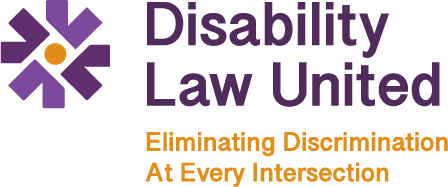Last Wednesday, Disability Law United teamed up with a huge and amazing group of civil rights and disability rights advocates to file an amicus brief in the Fourth Circuit Court of Appeals to help uphold the rights of people with disabilities to vote privately and independently.
The case originated in Maryland, when the National Federation of the Blind and several other plaintiffs went up against the Maryland State Board of Elections to protest the process of voting via absentee ballot. The plaintiffs alleged that defendants violated the Americans with Disabilities and the Rehabilitation Act by denying Maryland voters with disabilities the same opportunities to vote privately and independently that nondisabled voters enjoyed. Under the challenged process, Blind voters have to print out absentee ballots, have someone else mark them, and then submit them. This process is not only cumbersome, but impossible for a blind voter to achieve while maintaining their independence and the privacy of their vote. An existing (but not officially certified) online ballot marking tool would solve the problem, enabling blind voters to complete the entire process using screen readers or other accessible technology. The Maryland district court held that the Board was violating the ADA and Rehab Act, and ordered the Board to make the online ballot marking tool available to voters with disabilities in the November 2014 general election.
After allowing the online marking tool to be used during the 2014 election, the Board of Elections appealed the original decision. They argued that the voting system “as a whole” was accessible because votes with disabilities could vote in person at a number of different locations, and that therefore there was no need to use the online marking tool. The argument contained, in our view, seriously flawed interpretations of the ADA and Rehabilitation Act, which if endorsed by a judge, could severely limit the independence and rights of people with disabilities far outside the realm of absentee voting.
Jessie Webber and Dan Goldstein of Brown, Goldstein & Levy represent the Plaintiffs/Appellees, and we worked closely with Alyssa Fieo and Virginia Knowlton Marcus of the Maryland Disability Law Center to draft the amicus brief. It was a thrill to work with such amazing lawyers, and to be able to represent this all-star list of disability rights organizations in pointing out the misguidedness of the State’s views of the ADA: Maryland Disability Law Center, ADAPT Maryland, American Civil Liberties Union, Arc Maryland, Arc of the United States, Association of Assistive Technology Act Programs, disAbility Law Center for Virginia, Disability Rights Advocates, Disability Rights Bar Association, Disability Rights Education & Defense Fund, Disability Rights North Carolina, Freedom Center, IMAGE Center for People with Disabilities, Independence Now, Judge David L. Bazelon Center for Mental Health Law, League for People with Disabilities, Maryland Developmental Disabilities Council, Maryland Disabilities Forum, National Association of the Deaf, National Disability Rights Network, On Our Own of Maryland, Paralyzed Veterans of America, People on the Go, Protection and Advocacy for People with Disabilities, Southern Maryland Center for Independent Living, United Spinal Association, and West Virginia Advocates.
